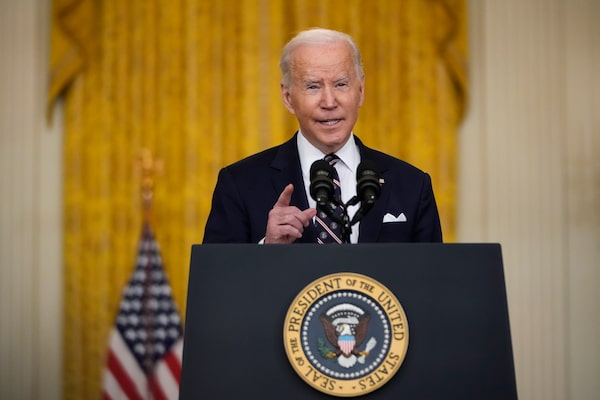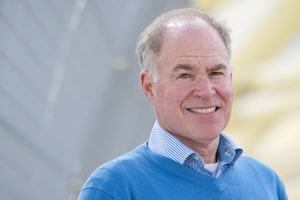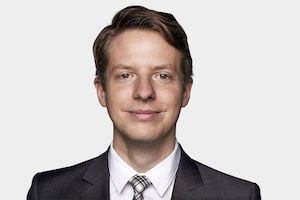
U.S. President Joe Biden delivers remarks on developments in Ukraine and Russia, and announces sanctions against Russia, on Feb. 22.Drew Angerer/Getty Images
Western countries and allies are imposing a range of sanctions on Russia to punish President Vladimir Putin for recognizing the independence of two breakaway regions in Ukraine and sending troops into its neighbouring country.
The measures targeting Russian banks, oligarchs and the Nord Stream 2 pipeline were unveiled Tuesday by the United States, Britain, Germany, the European Union, Canada, Australia and Japan. They go further than sanctions imposed in 2014 after Russia’s annexation of the Crimean Peninsula.
But critics are already saying the sanctions do not go far enough, and Ukraine’s Foreign Minister is calling on the U.S. and others to bring even more economic pressure to bear on Mr. Putin before he attacks further. The Russian government has spent years lessening its dependence on foreign imports and financial markets in an effort to blunt the effect these sorts of sanctions could have.
U.S. President Joe Biden said Tuesday that Mr. Putin was “carving out a big chunk of Ukraine” and “setting up a rationale to go much further” by recognizing Donetsk and Lugansk as independent countries and dispatching troops there.
“This is the beginning of a Russian invasion of Ukraine,” Mr. Biden told reporters at the White House.
Mr. Biden blocked Vnesheconombank (VEB) and Promsvyazbank (PSB), financial institutions that fund Russian development projects and the military, from doing business with Americans, froze the banks’ assets in the United States and curbed their access to the U.S. dollar.
He also barred Russian access to the U.S. sovereign debt market and imposed individual sanctions on five powerful Russians, including Promsvyazbank CEO Petr Fradkov and Aleksander Bortnikov, the head of the FSB, Russia’s spy agency.
Mr. Biden warned that he would impose further sanctions if Mr. Putin threatened more Ukrainian territory.
Russia-Ukraine conflict live updates: Putin granted permission to deploy military in Ukraine
The sanctions announced Tuesday are in addition to sanctions Mr. Biden announced Monday on Donetsk and Lugansk, which prevent U.S. citizens, residents and companies from doing business there.
British Prime Minister Boris Johnson said the British government will freeze the assets of five Russian banks and three oligarchs who have close ties to Mr. Putin. Government officials said the banks that have been singled out have been instrumental in financing Russia’s defence sector.
Among the billionaires targeted is Gennadiy Timchenko who has investments in energy, transport and finance and is chairman of Russia’s Kontinental Hockey League. He and the others had already faced sanctions in 2014 after Russia’s takeover of Crimea.
Mr. Johnson said Mr. Putin’s actions on Ukraine amounted to “an invasion of that country.”
Mr. Johnson also said further steps would be taken if Russian forces moved farther. “This is the first tranche, the first barrage, of what we are prepared to do; we will hold further sanctions at readiness,” he said.
Canada imposed its own financial sanctions and said it would dispatch up to 460 more soldiers to Latvia to bolster NATO’s eastern flank.
But Ukraine called on Western allies to take those actions immediately to pre-empt Mr. Putin’s next move.
“The world must respond with all its economic might to punish Russia for the crimes it has already committed. Ahead of the crimes it plans to commit, hit Russia’s economy now and hit it hard,” Foreign Minister Dmytro Kuleba said at a news conference in Washington with Secretary of State Antony Blinken.
In Germany, Chancellor Olaf Scholz effectively pulled the plug on the Nord Stream 2 pipeline by cancelling its certification process. “This may sound technical, but it is the necessary administrative step without which the pipeline cannot be certified,” Mr. Scholz told reporters at a news conference in Berlin. “Without this certification Nord Stream 2 cannot go into operation.”
The US$11-billion pipeline project has been in the works since 2015 and it was slated to bring gas from western Siberia to Germany. It was also expected to double the capacity of the existing Nord Stream 1 pipeline, which supplies millions of German homes. The project has been controversial for years and several European Union countries, notably Poland, have long urged Germany to cancel the pipeline.
The EU also announced measures on Tuesday that officials said will, among other things, hit “banks that are financing Russian military and other operations” in Donetsk and Lugansk. Josep Borrell, the EU’s High Representative for Foreign Affairs, said the measures targeted 27 Russians individuals and entities, as well as banks and the defence sector. The actions will also limit Russian access to European capital markets. The sanctions will “hurt Russia, and hurt a lot,” said Mr. Borrell.
Susanne Wengle, a political scientist who has studied the effects of sanctions on Russia, said stopping Nord Stream 2 was likely the most significant move announced Tuesday because of Russian’s heavy reliance on oil and gas revenues.
Whether the other sanctions will have much effect is less clear: Russia has spent more than a decade decreasing its reliance on Western imports, she said. Its sovereign wealth fund is worth nearly US$200-billion, giving the country a financial cushion. And its debt-to-GDP ratio is 18 per cent, making it less dependent on foreign debt markets than other countries (Canada’s ratio, for comparison, is 43 per cent and the U.S.’s is 134 per cent).
A tougher move, she said, would be levelling financial sanctions on Russian private-sector companies, which are more dependent on Western markets. The White House said Tuesday that the Treasury Department was evaluating further sanctions against other Russian banks but did not announce any immediate actions.
“It’s hard for the U.S. to really hurt Russia with sanctions because Putin has been trying to do this thing called ‘Fortress Russia,’ the sanction-proofing of the Russian economy,” said Prof. Wengle, who teaches at the University of Notre Dame in Indiana. “The Russian economy has become increasingly insolated as part of official policy.”
In Britain, Labour MP Hilary Benn said that since Mr. Johnson had called Russia’s actions an invasion, “Why is he waiting before he imposes full sanctions on Russia now?” Tory MP Iain Duncan Smith made a similar appeal in the House of Commons. “They need to feel the pain,” he said.
In the U.S., members of Congress ranging from Bob Menendez, the Democratic chair of the Senate Foreign Relations Committee to Republican representative Liz Cheney called on the White House to immediately unleash a full complement of sanctions.
Our Morning Update and Evening Update newsletters are written by Globe editors, giving you a concise summary of the day’s most important headlines. Sign up today.
 Paul Waldie
Paul Waldie Adrian Morrow
Adrian Morrow